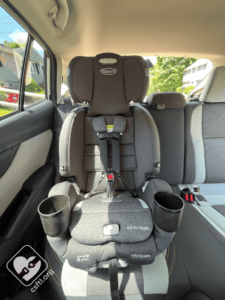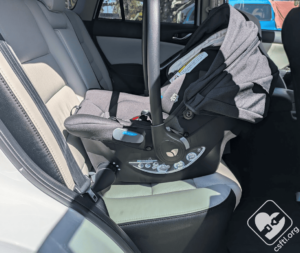Buckle Up: Every Drive Matters!
(Last Updated On: February 25, 2023)
Graco SlimFit3 LX – 3 year old
“The best car seat is the one that fits the child, fits the vehicle, and that the caregiver can use correctly every time.” As CPSTs, we often repeat this mantra when asked about seat selection. But even a seat that’s an excellent fit for a child and vehicle does no good if it’s not used on every single ride.
Most caregivers agree that a car seat or booster is essential for safety, but it can feel easy to find loopholes for those seemingly trivial drives. Some parents may choose to let their child ride in the front seat as a treat, or they may let their child who doesn’t pass the Five Step Test ride in the vehicle seat belt occasionally. Here are some common excuses we hear for making exceptions to best practice guidelines:
Excuse #1: We will only be on low-speed, familiar roads close to home.

Local roads are home to risks, too!
One study of vehicle crashes came to a startling conclusion: “Most children were in crashes occurring close to home, on local roads, on routes familiar to the driver, and within areas with relatively low speed limits” (Chen et al., 2005, 222). It’s counterintuitive that the slow, everyday drives can be riskier than a high speed road trip.
A “close to home effect” suggests that familiar routes and surroundings may cause experienced drivers to have reduced awareness and attention (Burdett, Starkey, & Charlton, 2017). These low-speed crashes close to home, frequently caused by lapses in attention, tend to occur at minor intersections and mid-blocks, rather than at the busy interchanges that demand attention (Burdett, Starkey, & Charlton, 2018). Most crashes occur within 10 miles of home. (Haas et al. 2015). Driving in your neighborhood or just down the block can be dangerous because it doesn’t seem to require as much focus as an unfamiliar destination would.
Excuse #2: It’s a quick ride, and I’m an excellent driver.
Even a very skilled driver has no control of other drivers on the road. It only takes one blown stop sign or a second of distracted driving to cause a collision. It may be a three-minute drive where you’re positive you’ll do everything perfectly, but that’s not enough to prevent a crash.
Excuse #3: Our taxi or ride share doesn’t legally require a car seat or booster seat.
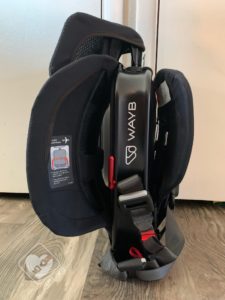
WAYB Pico folded
What’s legal doesn’t always equal what’s safe. The laws of physics remain the same, even in situations where it’s exceptionally inconvenient to bring a car seat along.
A CPST or our Facebook Group can help with suggestions for seats that would be light, compact, quick to install, or even foldable. If carrying a car seat just isn’t feasible, consider whether urban public transit might be a good option instead.
Excuse #4: It takes too long to buckle and unbuckle every child for these quick, nearby stops.
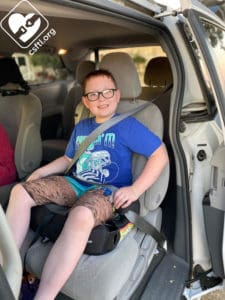
Graco Tranzitions SnugLock 9 years old backless booster mode
It may be tempting to forego the car seat or booster seat when you’re driving between parking lots or dealing with the carpool line. We can empathize with the frustration of unbuckling and buckling multiple children over and over while running errands. Once children are mature enough to handle the responsibility of unbuckling only at the appropriate time, a tool like the Unbuckle Me may be helpful.
Unfortunately, there isn’t an easy solution to this buckling and unbuckling process. With consistency, your Littles will grow to understand that the vehicle doesn’t move until everyone’s buckled, period.
Excuse #5: My kids won’t be able to enjoy the lights show, drive-thru safari, or car show from their car seat.

Holiday light show
Although it’s common to see kids hanging out the windows or popping out of the sunroof at these types of events, it’s contrary to best practice to be unrestrained in a moving vehicle. Crashes can happen even at low speeds; you’d be shocked how often we hear from people who are rear-ended while waiting in a fast food drive-thru lane. Consider attending other types of events instead if you’re not open to buckling your Littles in their seats for a driving event.
Be the Change
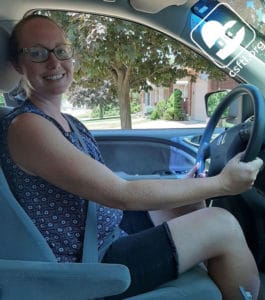
Awake driver, ready to drive safely!
You may receive pushback from others about your commitment to properly buckle your children regardless of the length or speed of the drive. Keeping your Littles safe often means making the inconvenient decision, rather than the easy one. With your children buckled into an appropriate seat that’s correctly installed and fitted to the child, you’ll have the confidence that you’ve protected them as best you can.
References
Burdett, B.R.D., Starkey, N.J., Charlton, S.G. (2017). The close to home effect in road crashes. Safety Science, 98, 1-8. https://doi.org/10.1016/j.ssci.2017.04.009
Burdett, B.R.D., Starkey, N.J., Charlton, S.G. (2018). Characteristics of the close to home crash. Safety Science, 105, 222-227. https://doi.org/10.1016/j.ssci.2018.02.020
Chen, I.G., Durbin, D.R., Elliott, M.R., Kallan, M.J., & Winston, F.K. (2005). Trip characteristics of vehicle crashes involving child passengers. Injury Prevention, 11, 219-224. http://dx.doi.org/10.1136/ip.2004.006767
Haas, B., Doumouras, A. G., Gomez, D., Mestral, C. D., Boyes, D. M., Morrison, L., & Nathens, A. B. (2015). Close to home: An analysis of the relationship between location of residence and location of injury. The Journal of Trauma and Acute Care Surgery, 78(4), 860. https://doi.org/10.1097/TA.0000000000000595
